Why Four Body Morgue Refrigerators Are Essential for Modern Facilities
A Four Body Morgue refrigerator is a specialized cooling unit designed to preserve up to four human remains simultaneously at optimal temperatures of 38°F (3.3°C). These compact yet powerful systems serve as the backbone for funeral homes, hospitals, and forensic facilities that need reliable, space-efficient storage without the footprint of larger walk-in coolers.
Key Features of Four Body Morgue Units:
- Capacity: Stores 4 bodies in individual chambers
- Temperature: Maintains 38°F (3.3°C) for preservation
- Power: Standard 110V plug-in operation
- Dimensions: Typically 77" W x 97" D x 83" H
- Construction: 4-inch urethane insulation with stainless steel interior
- Installation: Self-contained, no drainage required
These units have become increasingly vital during surge events. Recent events such as the pandemic, natural disasters, and the opioid epidemic have raised concerns about the treatment of human remains. Four body morgue refrigerators provide the perfect balance between capacity and space efficiency for facilities managing fluctuating caseloads.
The modular design allows for knocked-down shipping to reduce freight costs, while independent compressor systems ensure that if one chamber fails, the others continue operating. This reliability factor makes four body units particularly valuable for rural county morgues, small hospitals, and removal companies where backup options may be limited.
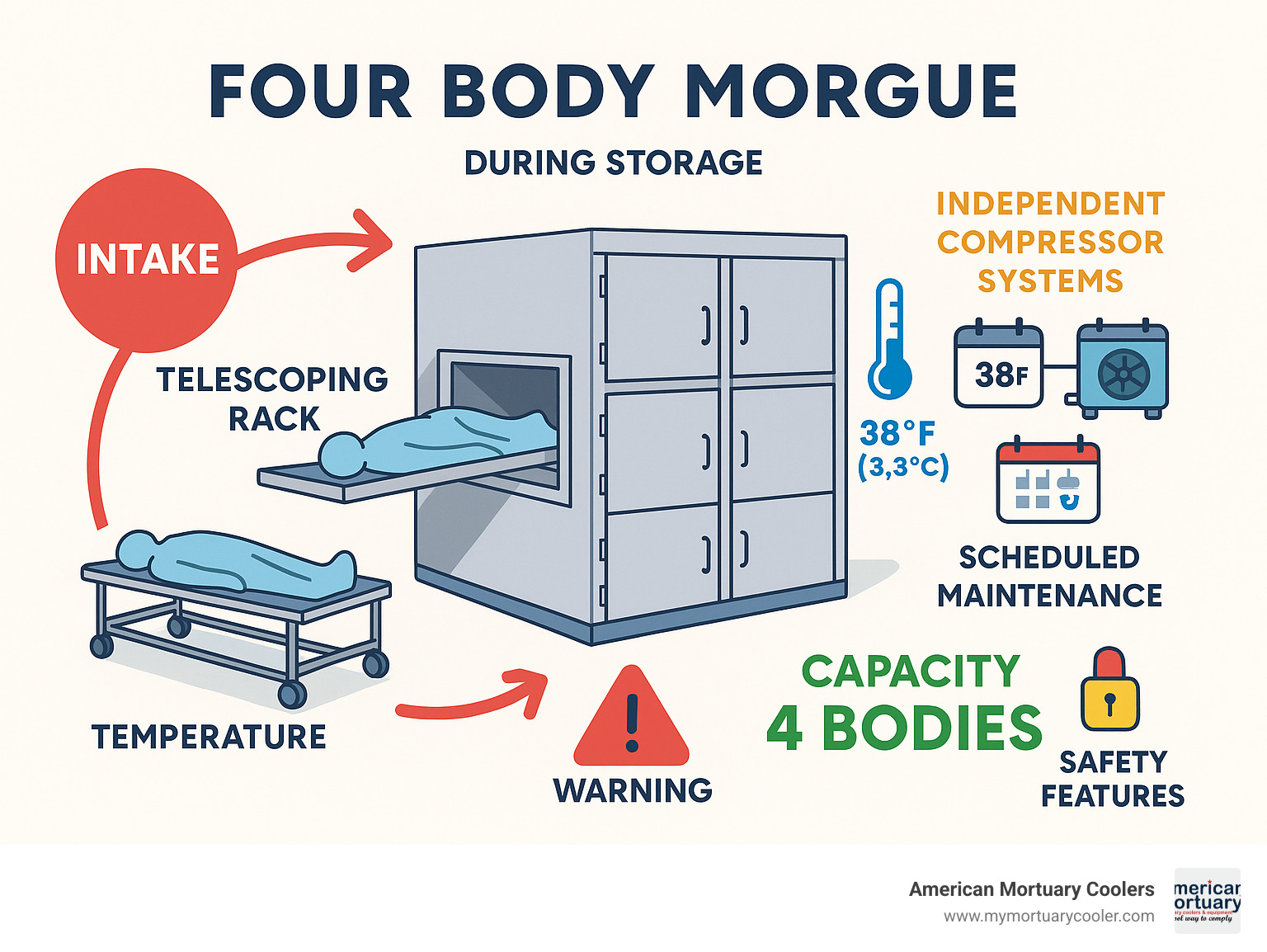
What Is a Four Body Morgue Refrigerator?
A Four Body Morgue refrigerator is your reliable workhorse for storing four human remains in separate, temperature-controlled chambers. Think of it as the ideal solution for mortuary refrigeration – providing dependable storage without the complexity of a full walk-in cooler. For background on how morgues are traditionally organized, see the Wikipedia entry on morgues.
What makes these units special isn't just their size. They're built specifically for mortuary science, using materials and features that standard commercial refrigerators simply can't match. The stainless steel interior resists corrosion and cleans easily, while 4-inch urethane insulation maintains precise temperatures even during power fluctuations.
Hospitals use four body morgue refrigerators when they need temporary storage for patients who have passed away. Funeral homes rely on them during busy periods or when embalming gets delayed. Forensic labs and medical examiner offices appreciate the flexibility these units provide for investigation cases that require extended storage.
The capacity versus footprint equation works beautifully with these units. At roughly 77" wide by 97" deep by 83" high, they occupy about the same floor space as a large commercial freezer while providing organized, dignified storage for four separate remains.
Core Applications of a Four Body Morgue
Rural hospitals represent the sweet spot for Four Body Morgue refrigerators. These facilities don't see enough volume to justify a full walk-in morgue, but they absolutely need reliable storage when deaths occur. The self-contained design means no special drainage, no major renovations – just plug it in and you're ready.
County coroners face unique challenges. Most months might bring only a handful of cases, but then a multi-vehicle accident suddenly requires storage for several individuals. The independent compressor system becomes crucial here – if one chamber has mechanical issues, the other three keep your other cases properly preserved.
Disaster response scenarios showcase the true versatility of four body morgue systems. Emergency management agencies can deploy these units quickly to provide temporary morgue capacity during mass casualty events.
Four Body Morgue vs. Other Capacities
Two-body units seem economical until you face your first busy week. Six-body refrigerators offer more storage but demand significantly more floor space and power. Twelve-body units move into walk-in cooler territory, requiring professional installation and dedicated electrical service.
| Capacity | Typical Dimensions | Power Needs | Best For |
|---|---|---|---|
| 2-Body | 44" × 94" × 83" | 110V, 15A | Small funeral homes, clinics |
| 4-Body | 77" × 97" × 83" | 110V, 20A | Rural hospitals, county morgues |
| 6-Body | 94" × 97" × 83" | 208V, 30A | Regional facilities, large funeral homes |
| 12-Body | Walk-in size | 208V, 50A+ | Medical examiner offices, major hospitals |
Key Specifications & Construction Details
When investing in a Four Body Morgue refrigerator, understanding the construction details helps you appreciate why these units deliver reliable performance year after year. The standard external dimensions of 77" W × 97" D × 83" H are carefully designed to maximize storage while still fitting through standard commercial doorways when shipped as modular panels.
The insulation uses 4-inch thick foamed-in-place urethane that's far superior to regular commercial refrigeration. This UL-listed Class 1 insulation delivers an impressive R-value and maintains consistent internal temperatures even when the room gets hot or cold.
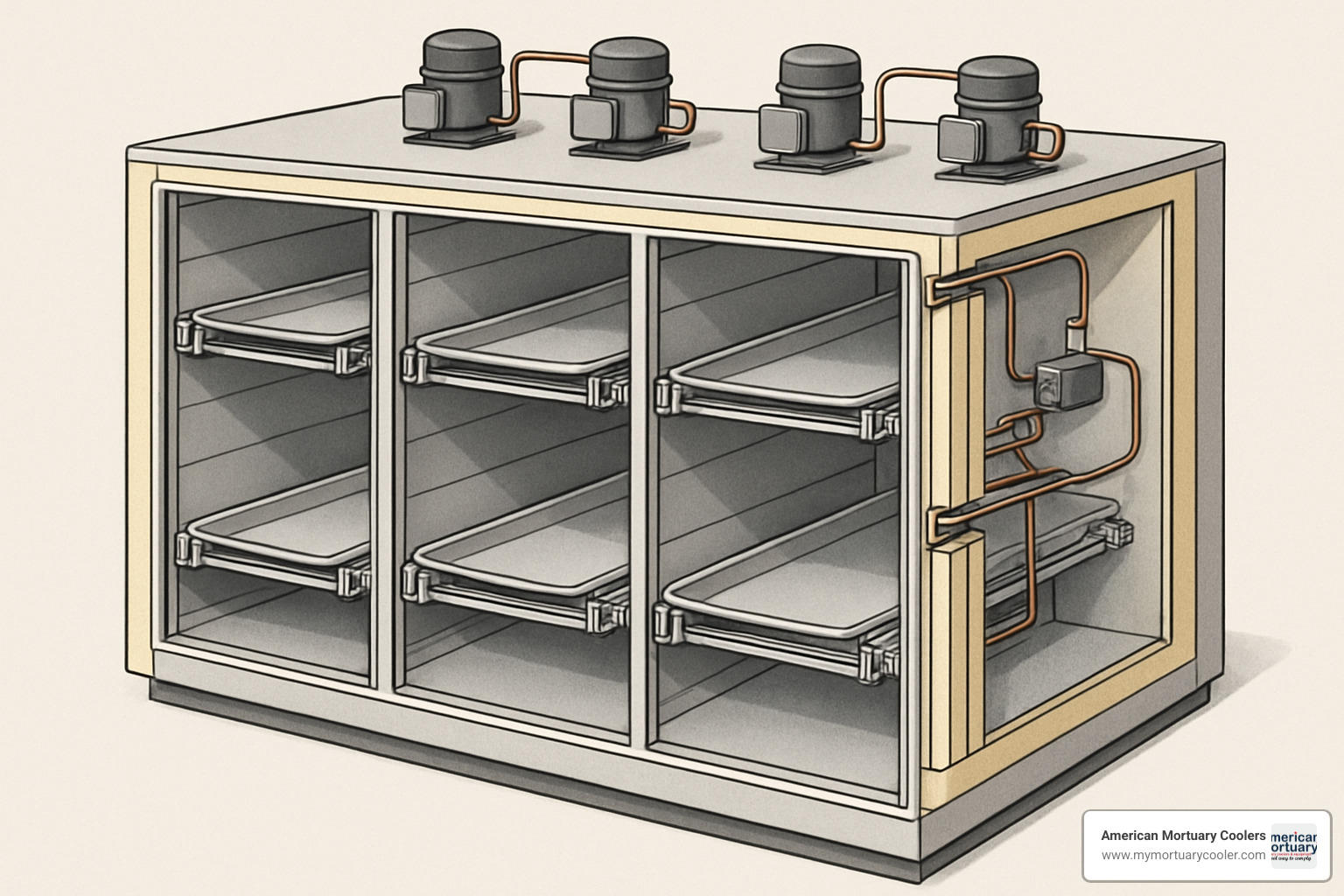
The construction materials focus on both durability and easy cleaning. Inside, you'll find Type 304 stainless steel with a No. 4 finish that resists corrosion and wipes clean easily. The exterior uses stucco embossed aluminum on the top, sides, and back, while the front maintains stainless steel.
Four Body Morgue refrigerators feature independent compressor systems. Each chamber has its own compressor, so if one has mechanical trouble, the other three keep working normally. Most units operate at 38°F (3.3°C), with freezer options available down to -10°C (-14°F) for long-term forensic storage.
Doors & Configurations
The door configuration directly affects how smoothly your daily operations run. The most common setup features four individual doors, each measuring approximately 27" W × 22" H. These overlap-style doors use magnetic gaskets that create airtight seals.
Upright configurations make better use of floor space compared to horizontal drawer systems. Telescoping rack systems extend up to three-quarters of their length, allowing full head-to-toe viewing when needed without awkward reaching.
Interior Storage Systems
Roller rack systems provide effortless loading and unloading using heavy-duty rollers. Telescoping racks extend outside the unit for easier access and viewing. Body trays provide the actual support surface, typically made from stainless steel with standard dimensions of 1950mm × 580mm (approximately 77" × 23").
Load capacity ratings support up to 1,000 pounds per square foot for point loads, ensuring structural integrity even with heavy cases.
Installation, Power, and Operation
Setting up a Four Body Morgue refrigerator is straightforward – no need for specialized electricians or complex installation teams. These units require only a standard 110V electrical outlet to get up and running.
Power requirements stay reasonable for most facilities. Your standard unit runs on 115V/60Hz single-phase power, typically drawing 15-20 amps during normal operation. Remote condensing options offer a solution when you need the cooling power but want to keep the noise and heat somewhere else.
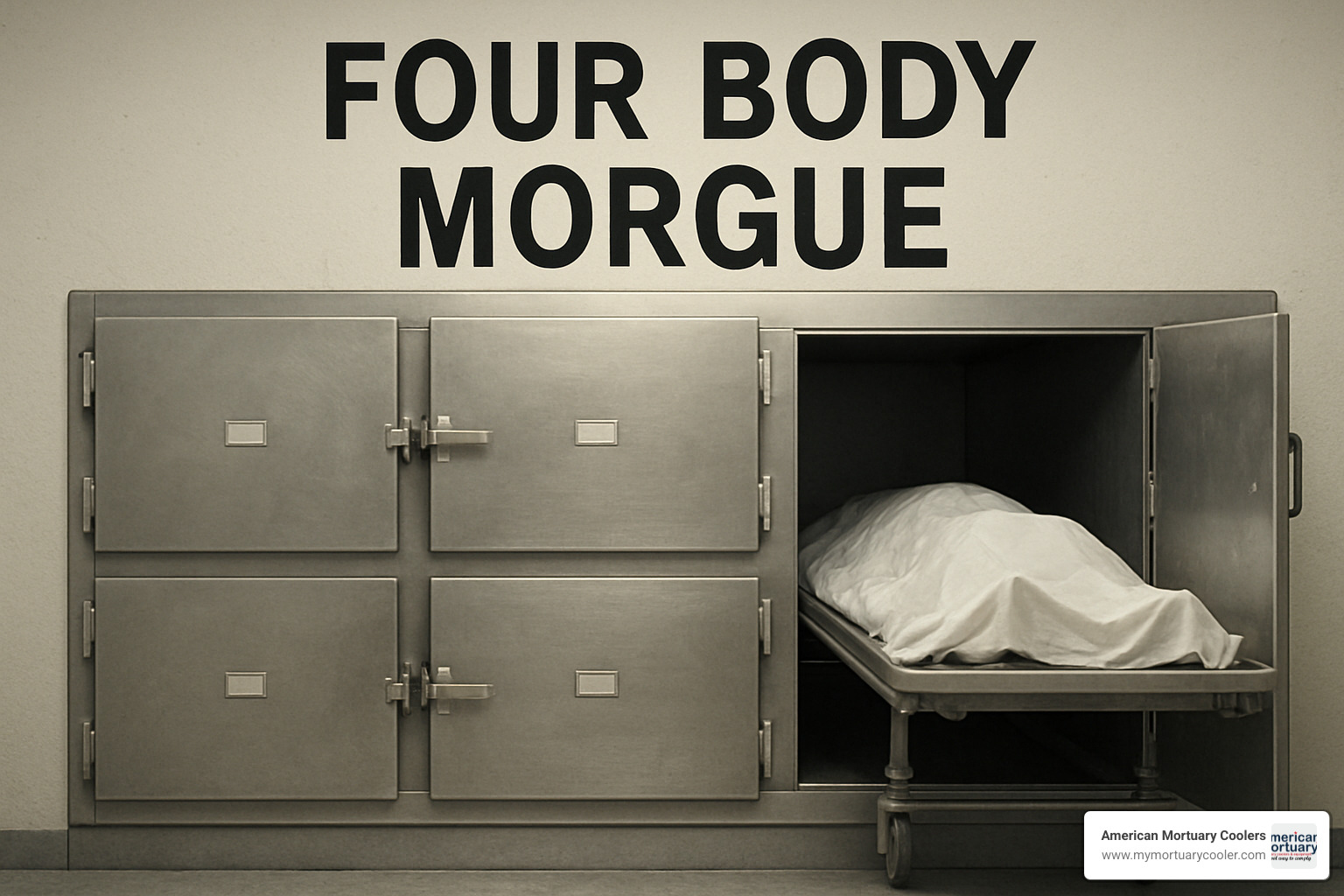
The cam-lock panel system represents clever engineering. These panels lock together with simple quarter-turn mechanisms, creating a structure as solid as welded construction. If you ever need to relocate the unit, it can be disassembled and moved without major headaches.
Site preparation couldn't be simpler. A level concrete or masonry floor provides the ideal foundation. Unlike walk-in coolers, there's no need for floor drains or special ventilation – these are completely self-contained systems.
Temperature Control & Refrigeration Science
The temperature control system maintains temperatures within ±1°F of your setpoint. That standard 38°F (3.3°C) operating temperature dramatically slows bacterial growth and decomposition while avoiding the tissue damage that freezing can cause.
Automatic defrost cycles prevent ice buildup that could compromise cooling efficiency. Power outages don't have to mean disaster with backup UPS options that maintain critical cooling for several hours.
Safety & Compliance Features
Safety features protect both your staff and the remains in your care. Locking doors prevent unauthorized access while ensuring only trained personnel can open storage chambers. Inside safety releases provide protection, allowing anyone accidentally trapped inside a chamber to open the door from the interior.
Temperature alarms offer both local and remote notification when conditions could compromise stored remains. UL-listed panels ensure insulation materials meet fire safety standards.
Maintenance, Cleaning, and Longevity
Taking care of your Four Body Morgue refrigerator isn't complicated, but it makes all the difference in keeping your equipment running smoothly for decades.
Daily maintenance means wiping down surfaces with appropriate sanitizers, paying extra attention to door seals and handles. Monthly coil cleaning is crucial – those condenser coils collect dust and affect cooling efficiency. Annual gasket checks prevent damaged door seals that waste energy.
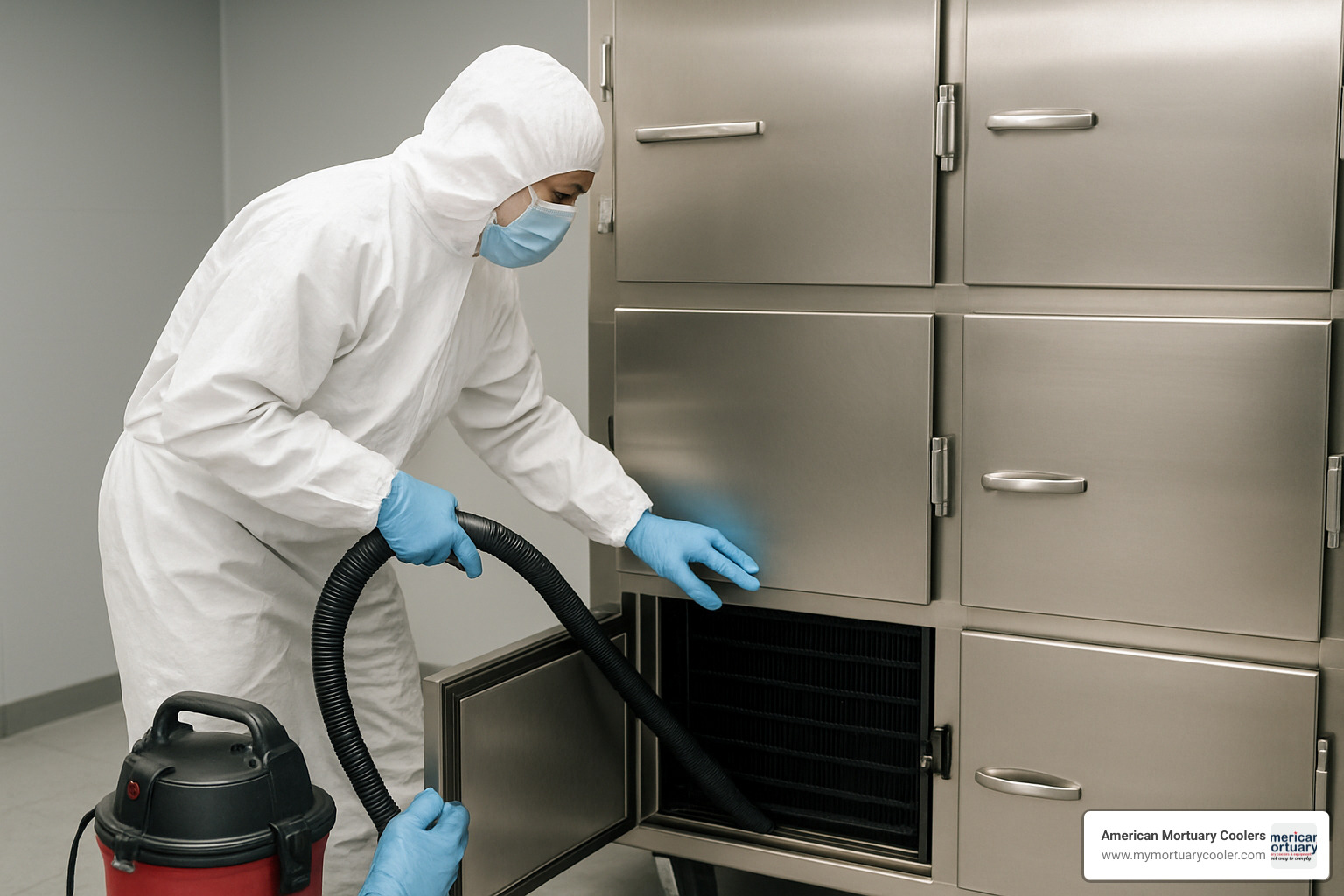
The warranty coverage reflects manufacturer confidence in construction quality. You're typically looking at 15 years on panels and doors and 5 years on mechanical components. Most units also come with 2 years of comprehensive parts and labor coverage.
A properly maintained Four Body Morgue refrigerator often runs strong for over 20 years. The modular construction means you can replace individual components as they wear out instead of buying a whole new system.
Troubleshooting & Common Issues
Compressor troubles are rare but serious. You'll usually hear unusual noises or notice poor cooling. The beauty of independent compressor systems is that if one goes down, the other chambers keep working.
Door seal problems are more common and easier to fix. The "dollar bill test" works great – close a dollar bill in the door and try to pull it out. If it slides out easily, your seal needs attention.
Temperature fluctuations often have simple fixes: check that doors close completely, inspect seals, and ensure nothing blocks air vents.
Buying Guide: Budget, Customization, and Shipping
Investing in a Four Body Morgue refrigerator typically ranges from $8,000 to $13,000, but the final price depends on several factors that affect your daily operations.
Construction materials impact both cost and longevity. Stainless steel construction costs more upfront than aluminum alternatives, but provides better durability and easier cleaning. Independent compressor systems increase initial investment but are worth it when one compressor failure won't shut down your entire unit.
Caster options add mobility but increase costs and can affect temperature stability. Pass-through configurations allow access from both sides but require custom engineering. White-glove delivery services include professional unloading, positioning, and basic setup.
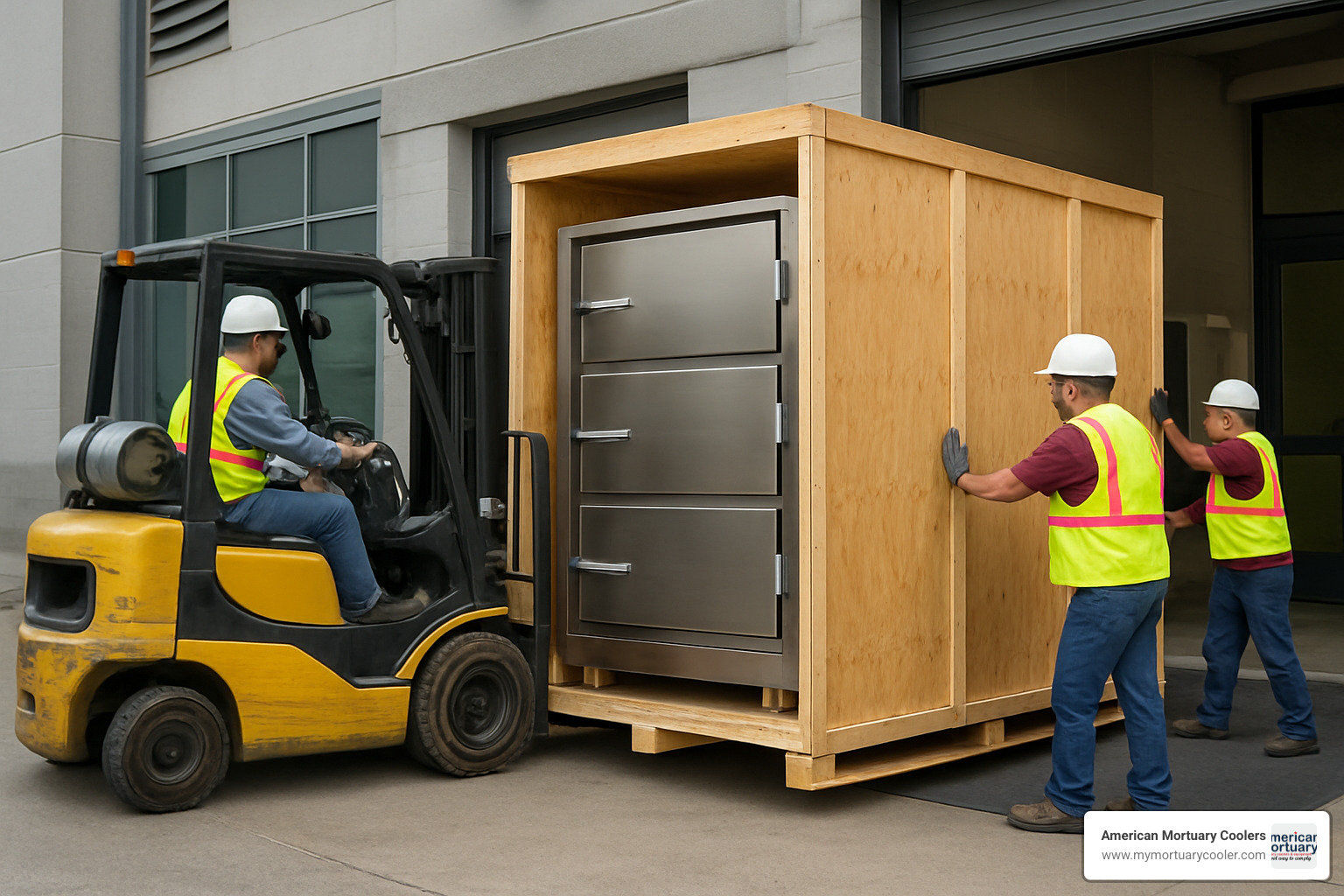
Comparing Vendors & Warranties
Choosing the right vendor involves looking beyond the initial price tag. Lead times vary dramatically among manufacturers, especially for custom configurations. U.S.-made versus imported units present real trade-offs in service response and construction quality.
Direct delivery capabilities eliminate distributor markups and provide direct communication with the manufacturer. Service network availability significantly affects your long-term operating costs and potential downtime.
A proper quote breakdown should include equipment cost, shipping, installation support, and warranty coverage. Warranty coverage varies considerably among vendors – look for comprehensive coverage that includes both parts and labor for at least the first two years.
Frequently Asked Questions About Four Body Morgue Units
How cold does a four body morgue need to be?
The optimal temperature for a Four Body Morgue refrigerator is 38°F (3.3°C). This temperature slows down decomposition processes dramatically while keeping tissues in good condition for viewing or preparation work. It's cold enough to preserve dignity and prevent deterioration, but not so cold that it creates problems later.
For long-term forensic storage, freezer options can go as low as -10°C (-14°F). However, freezing temperatures can make examination or embalming work more complicated later on. Most facilities stick with the standard 38°F setting.
The digital controllers keep temperatures within ±1°F of your setpoint, providing remarkable consistency once properly set up.
Can I assemble a unit in a basement or tight hallway?
The modular panel design was specifically created to solve this problem. Your Four Body Morgue ships in individual panels that can squeeze through doorways as narrow as 30 inches. We've installed units in church basements, hospital sub-levels, and funeral homes with narrow hallways.
The cam-lock assembly system requires no special tools, no welding, no complicated procedures. The panels lock together with simple quarter-turn mechanisms that create incredibly strong connections. You'll want about 3 feet of clearance around your installation area, but experienced installers have worked in much tighter spaces when necessary.
What power supply is required?
A standard Four Body Morgue runs on regular 115V/60Hz/1-phase power – basically the same electrical service you'd use for a large commercial appliance. You'll need a dedicated 15-20 amp circuit, which most commercial buildings already have available.
Optional 208-230V configurations are available for facilities with different electrical standards or those wanting slightly better efficiency. The self-contained design means no drainage connections, no special electrical installations, and no infrastructure headaches.
Conclusion
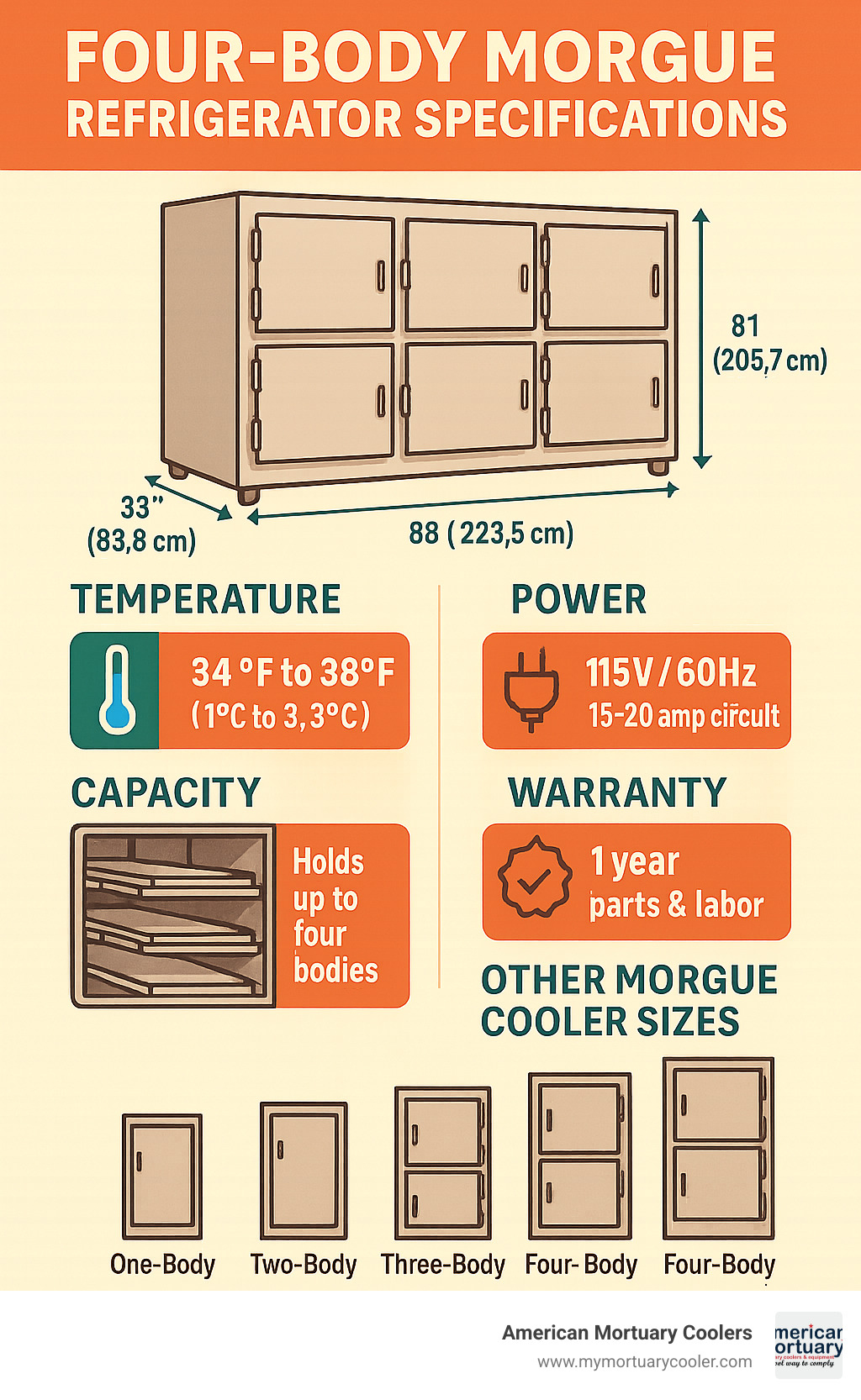
When families face the loss of a loved one, they deserve to know that their family member is being cared for with dignity and respect. A Four Body Morgue refrigerator provides exactly that assurance, offering reliable storage that gives families the time they need to make important decisions without rushing through difficult moments.
These units have proven themselves as the backbone of countless funeral homes, hospitals, and county morgues across the country. The independent compressor design means that even if one chamber experiences issues, the other three continue protecting their precious cargo. The precise temperature control maintains that critical 38°F exactly where it needs to be, day after day, year after year.
What makes these refrigerators truly special isn't just their modular construction or plug-and-play simplicity. It's the peace of mind they provide to facility operators who understand that equipment failure isn't just an inconvenience—it's a crisis that affects grieving families during their most vulnerable time.
The space-efficient design allows even smaller facilities to provide professional-grade storage without the massive footprint of walk-in coolers. Whether you're a rural county coroner handling a few cases each month or a busy funeral home managing surge capacity during difficult times, these units adapt to your needs rather than forcing you to adapt to them.
At American Mortuary Coolers, we've seen how the right equipment makes all the difference in serving families with dignity. Our Tennessee-based team takes pride in delivering quality Four Body Morgue refrigerators directly to your facility across all 48 contiguous states, ensuring you get exactly what you need when you need it.
The investment in a quality morgue refrigerator pays for itself through years of dependable service and the confidence that comes from knowing you're prepared for whatever challenges arise.


















